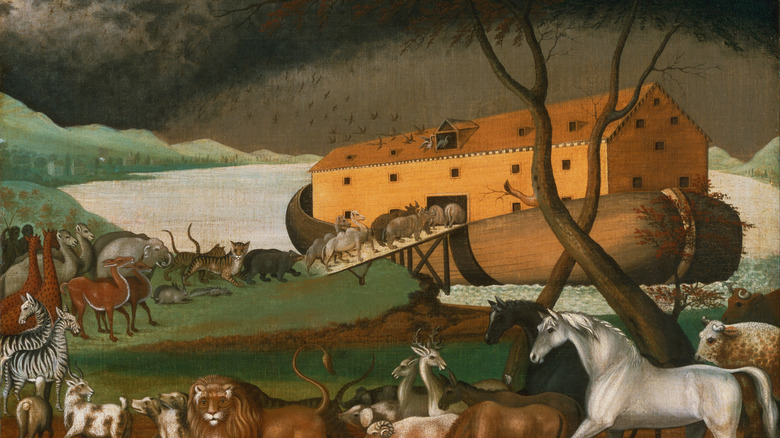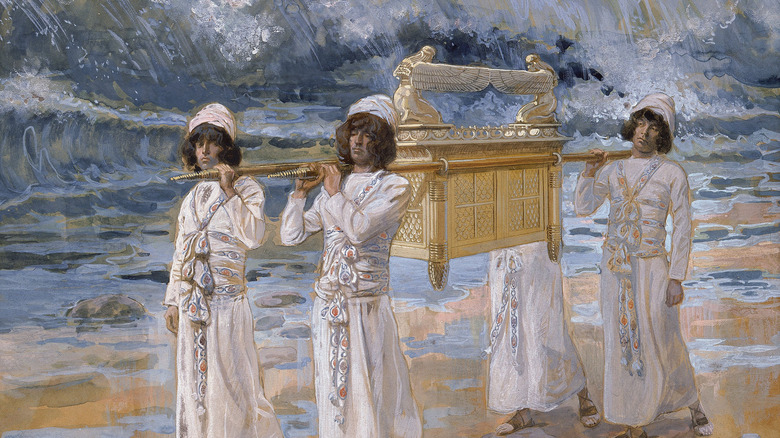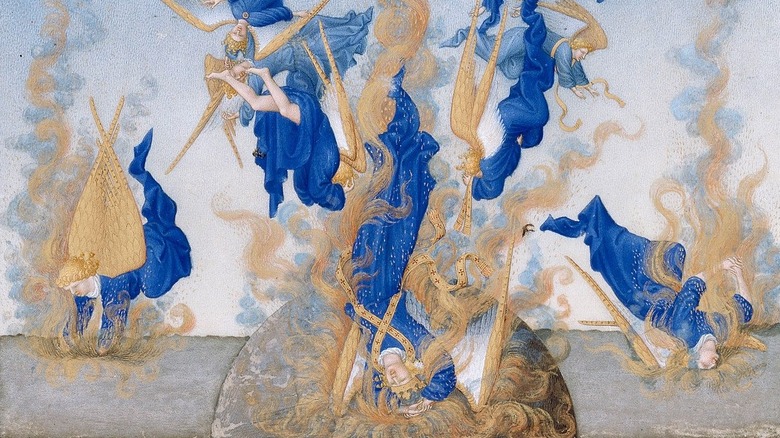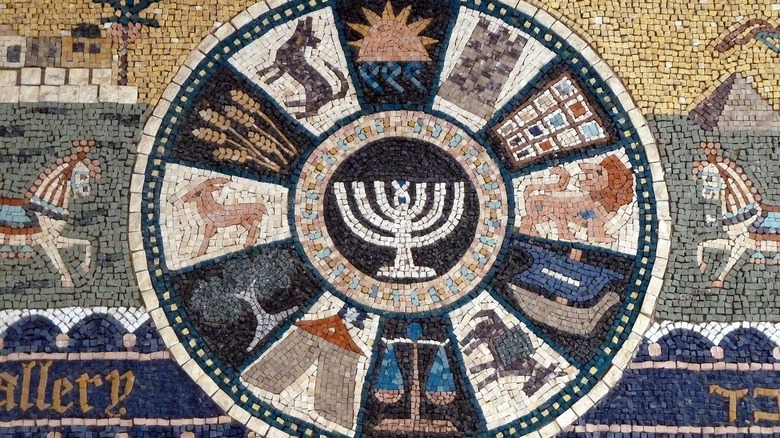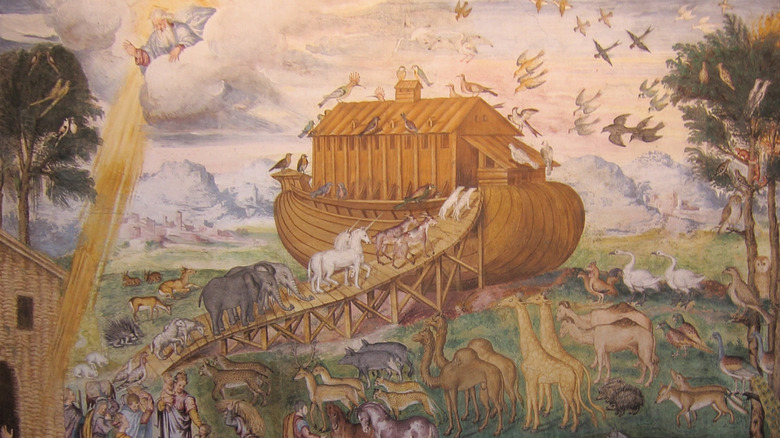The Biggest Unanswered Questions In The Bible
The Bible is a deeply complicated text, to say the least. It's densely packed with historical accounts, exhaustive genealogies, allegories, poetry, and all manner of other things. And, given that many of the books that make up the Bible are thousands of years old, it maybe shouldn't come as too much of a surprise to learn that there are plenty of big questions contained therein.
Some of them can be answered with a bit of historical research and perhaps self-reflection, but that doesn't cover all of the stories that trail off into seemingly nothing, leaving us confused. And, if someone is of the Biblical literalist persuasion, a few questions can get especially thorny or difficult to reconcile with the world around us today. For instance, how is someone supposed to reconcile the two noticeably different creation stories that happen one right after the other in the first couple chapters of Genesis? And how did a genetically diverse species arise from just two humans, anyway?
These questions aren't confined to the Old Testament, either. Even the seemingly complete life of Jesus actually has a pretty significant gap for much of his adolescence and remaining adult life. What exactly was the Messiah up to for 18 years, anyway? It could be that yet more research will help answer some of these quandaries, but others might hold more of a lesson about sitting with the unknown. These — and more — are some of the biggest unanswered questions in the Bible.
Where is the Garden of Eden?
The Garden of Eden is where both Adam and Eve were created, got into the tree of the knowledge of good and evil, incurred God's wrath, and were cast out of their plum living situation. Genesis 3:23-24 further notes that, upon kicking out the two humans, fearsome angels known as cherubim were paced as guards at the eastern face of the Garden, wielding flaming swords.
Metaphorically speaking, you could make the case that humanity has been trying to get back to the Garden of Eden ever since. And, for some people at least, that metaphor has also become something of a reality. After all, if you accept that the Bible is literally true or at least has some basis in the real, physical world we're experiencing right now, then it stands that there is an actual Garden of Eden somewhere on the planet.
"Paradise Lust: Searching for the Garden of Eden" notes that the Bible gives some hints in Genesis 2, which claims that a river flows out of the Garden and branches into four other rivers. That's led some to pinpoint Eden's location in modern-day Turkey or Armenia, while "From Eden to Exile" thinks Mesopotamia is a better bet. Some have gone even farther afield, such as when Joseph Smith, founder of the Church of Jesus Christ of Latter-day Saints, received a revelation that it was actually in Jackson County, Missouri. Yet, no one's been able to definitively pin down a location for the Garden of Eden.
Why are there two creation stories?
Careful readers of the Book of Genesis will note that there's a bit of a discrepancy in the text's very first pages: There are two different creation stories. According to Bible Odyssey, the first chapter of Genesis describes the creation of both a woman and a man at the same time. Yet, the very next chapter says the human sexes were created separately. What's more, the two accounts have different names for God (Elohim in the first and YHWH in the second) and have pretty distinct stylistic divergences, too. BioLogos also notes that the creation timelines differ, and there's even a slight hint in the first story that more than two humans were created at once.
For some scholars and readers, it's enough to conclude that these are two somewhat different creation stories that were mashed together during the textual assembly of Genesis and the Bible. That essentially reduces it to an editorial issue, but not a theological one. But, for Biblical literalists, this is an awkward conundrum. Moreover, where did those accounts come from, and who assembled them?
BioLogos concludes that we just aren't meant to take these different creation stories at face value, but should lean more towards a metaphorical interpretation. My Jewish Learning argues that the accounts offer a cosmic and then Earth-centric point of view, respectively. Still, neither argument offers up a solid explanation for how such a big question arose in just the first two chapters of the Bible.
Who were the sons of God?
Genesis 6 starts off with a seemingly odd digression that has left people poring over its particulars for centuries. Right before we get to the story of Noah, his Ark, and the Great Flood, we're treated to a story that's apparently meant to demonstrate how wicked the pre-deluge world had become. In it, the "sons of God" find themselves highly attracted to human women. They pair off and have children who become "the heroes of old, men of renown." The verses also reference their offspring, referred to as "Nephilim" in the New International Version of the Bible, while the King James Version instead speaks of "giants in the earth."
Who, exactly, were these mysterious sons of God? Per the Biblical Archaeology Society, the sons of God (Benai-Elohim in Hebrew) were basically making pagan demi-gods. Yet, for a culture that was transitioning to monotheism, the existence of other divine beings could get pretty tricky, theologically speaking. This short passage could be a kind of warning to other folks to cut it out and stop enjoying tales of semi-divine heroes, lest they anger God.
That potentially takes care of the Nephilim question, but it doesn't clear up much about their fathers. Britannica notes that some have simply concluded that the sons of God were fallen angels, while more mundane interpretations hold that they were really just the descendants of Seth, one of Adam and Eve's children. But Genesis 6 itself isn't giving up that secret anytime soon.
What happened to the Ark of the Covenant?
Taken from a Biblical point of view, there's not much question that the Ark of the Covenant existed. It's referenced in multiple points throughout both the Old and New Testaments, most directly in Exodus 25:10-22. In these verses, the Hebrew people are commanded to make a gilded wood structure to contain the "tablets of the covenant law" — that is, the Ten Commandments.
Given how important the ark and its contents are, it seems pretty surprising that humanity lost track of it. Yet, 3,000 years or so is a long time and plenty of history for scholars and adventure-seekers alike to have a field day with the mystery. According to Britannica, the most popular theory is that it ended up in Ethiopia by way of the Queen of Sheba and King Solomon's son, Menelik. As an adult, Menelik went to visit his dad, who sent him back to Ethiopia with a group of Jewish retainers, who took it upon themselves to snag the Ark on their way out of Jerusalem. The story is detailed in the "Kebra Negast," the 14th-century national epic of Ethiopia. It supposedly sits in Aksum today, guarded by a single monk who won't let anyone see it.
This being a pretty persistent mystery, however, means that there are plenty of other claims. National Geographic reports that some believe the Ark is hidden beneath Jerusalem somewhere, while plenty of people have taken the story in even wilder directions.
Who is Lucifer?
When faced with this question, you night confidently say, "Satan, duh" — but not so fast there, dear reader. Take a careful look at the Old Testament Bible verse that mentions Lucifer — Isaiah 14:12-17 — and you'll find that there's no mention of Satan, the Devil, or really any sort of direct connection between this fallen angel and the archfiend that's come to haunt our imagination. Instead, the figure in question is referred to as either "Lucifer" or even more vaguely as "morning star," depending on the particular translation in your hands. It certainly refers to a divine figure who aspired to, in his words, "raise my throne above the stars of God" and was cast out of heaven for the offense. But is it Satan? Further confusing matters is a New Testament verse from Luke 10:18-20, which does reference Satan falling "like lightning from heaven."
History notes that much of the connection between Lucifer and Satan is the result of post-Biblical Christian tradition. And it could well be that "morning star" is a bit more accurate, meaning that "Lucifer" isn't a name so much as a regular old noun or description, as Bible.org argues. It could even be in reference to a Babylonian ruler. Or not. Even if you start digging into the various Hebrew phrases used in the original text, however, the only thing that's clear is that no one seems to agree on this. The identity of Lucifer remains pretty shadowy.
What happened in Jesus' lost years?
You'd think that Jesus, being the central figure of Christianity, would have a pretty well-documented life. But, per "All the People in the Bible," the so-called "lost years" of Jesus span from when he was 12 to 30. What was he doing during this time? If you read the Bible, you'd come back with about as much information as when you left: precious little.
So what happened over the span of those 18 years? No one's definitely sure, though there are plenty of colorful theories that attempt to explain it all. The most likely theory, at least according to "All the People in the Bible," was that Jesus probably continued on in unremarkable fashion in Nazareth, apparently so much so that, when he did begin to preach, Matthew 13:53-57 notes that his neighbors were surprised and even offended at his new tack in life.
Others have proposed that Jesus went to study elsewhere, perhaps with the Essene religious group in the desert or maybe even in Alexandria, Egypt, lack of evidence notwithstanding. Some of the wilder theories shared by History claim that Jesus may have gone wandering about the region for much of that time, or somehow traveled as far as Britain with his uncle, a tin trader known as Joseph of Arimathea. One 19th-century writer even held that Jesus made it to India and studied with Buddhist monks, though, like all the other theories, there's little direct evidence to back it up.
How did humanity multiply after Adam and Eve?
Let's assume that the only human beings directly created by God were Adam and Eve. After the pair are expelled from Eden, they go on to have children. All well and good so far, at least logistically speaking. But the next generation after these two presents a serious question that could make your skin crawl. For humanity to keep growing, Adam and Eve's children must find partners as well. But their dating pool is alarmingly limited to only their own brothers and sisters. So, did the very first humans intermarry?
According to Big Think, this simply doesn't work out scientifically. For a population of humans to be healthy, it needs far more genetic diversity than what two progenitors can provide. Genetic studies show that our species needed somewhere in the neighborhood of 12,000 people, minimum, to produce the sort of diversity we see today.
Now, you could resort to some theological hand waving and say that God simply made it so that we wouldn't be full of inbred genetic disorders, at least not at first (via Bible.org). But that's not enough for some scholars, who also find the Bible to be frustratingly vague on this point. Per Aleteia, the scriptures simply say that early figures like Cain just found a wife without specifying their relationship. For some scholars, that's enough of a hint to think that maybe God created more than two humans, though the Bible leaves that question unanswered, too.
What happened to the Lost Tribes of Israel?
According to PBS, nearly three millennia ago, there were 12 tribes of Hebrew people that came together and formed the Kingdom of Israel, as well as the Kingdom of Judah. The tribes of Judah and Benjamin, which formed the latter kingdom, have a decently well-documented history and are typically considered the progenitors of modern Jewish people. But the ten other tribes were eventually overtaken by Assyria in the eighth century B.C. and, as the story goes, were exiled from the Kingdom of Israel and thus "lost."
Ever since then, people have spent a lot of ink and intellectual power trying to figure out where, exactly, those lost tribes might have gone. Some, like the 12th-century Benjamin of Tudela, believed that at least some of them traveled to Persia and parts of the Arabian Peninsula. Other theories have ranged even farther, Britannica reports, with some claiming that the Lost Tribes traveled great distances to Ethiopia, North America, and Asia.
Then again, it's possible that many people of the Kingdom of Israel assimilated into the larger non-Jewish culture over the generations, too. They would have simply faded away rather than keep their unique way of life, though that's not exactly the stuff of a rollicking adventure story, as disappointed explorers might tell you. Whatever the real conclusion, incomplete histories and a lack of agreed-upon identifiers means that no one can be sure what really happened to the Lost Tribes of Israel.
Where is Noah's Ark?
In Genesis, God commands Noah, one of the last righteous people remaining on Earth, to build a gigantic boat known as an ark. According to Genesis 7, Noah and his family are supposed to cram into the ark, along with a full complement of animals, to ride out a massive storm that will wipe out the rest of the wicked world. Noah dutifully does just that, survives the 40-day and 40-night flood, and eventually disembarks to start humanity over again. But Genesis doesn't mention what happens to the humongous, floating construction project that humanity has just left behind. So, what happened to Noah's Ark?
First, we should set aside questions as to how a flood could cover the Earth or how one man and his family could build a boat big enough to hold all the animals ever. It might have happened in some localized form but, as Live Science notes, no one's uncovered evidence of a global flood. Some people have claimed to have found evidence of the ark, though their findings have come under intense scrutiny.
National Geographic reports that quite a few investigators have said they've found the ark, including an announcement that wooden fragments discovered on Turkey's Mount Ararat were the real deal. Yet, direct evidence isn't forthcoming. What's more, some researchers suggest that the ark could have been dismantled, given that all that precious timber probably wouldn't have been left to rot in the elements when humanity needed shelter.
What exactly happened to Enoch and Elijah?
Enoch and Elijah are both figures in the Old Testament whose ultimate fates are pretty mysterious. Enoch, who happens to be the father of the Bible's oldest-ever man, the 969-year-old Methuselah, appears briefly in Genesis 5, where he "walked faithfully with God; then he was no more, because God took him away." It's all very cryptic and, though there are quite a few extra-Biblical sources that claim to expound upon Enoch's life, that's all we get of him in the canonical Bible, per the World History Encyclopedia. Most interpretations claim that Enoch was taken up to Heaven without the troublesome dying part, though it's not clear why Enoch earned that honor or how it all happened.
A similar, though more eye-catching, incident happened at the end of the prophet Elijah's life. According to "All the People in the Bible," Elijah goes out walking with his protégé, Elisha. A chariot of fire appears, Elijah is drawn up into the vehicle, and then disappears amongst a great tumult of wind. This dramatic exit from Earth makes a bit more sense, given that Elijah is a big-time prophet whose glorious ascension to Heaven in a flaming chariot is highly symbolic. But, yet again, it's not clear why Elijah would get this privilege above other prophets. And, from a literalist point of view, how is a full-bodied human supposed to make it to Heaven when everyone else leaves their remains behind? We still don't know.
